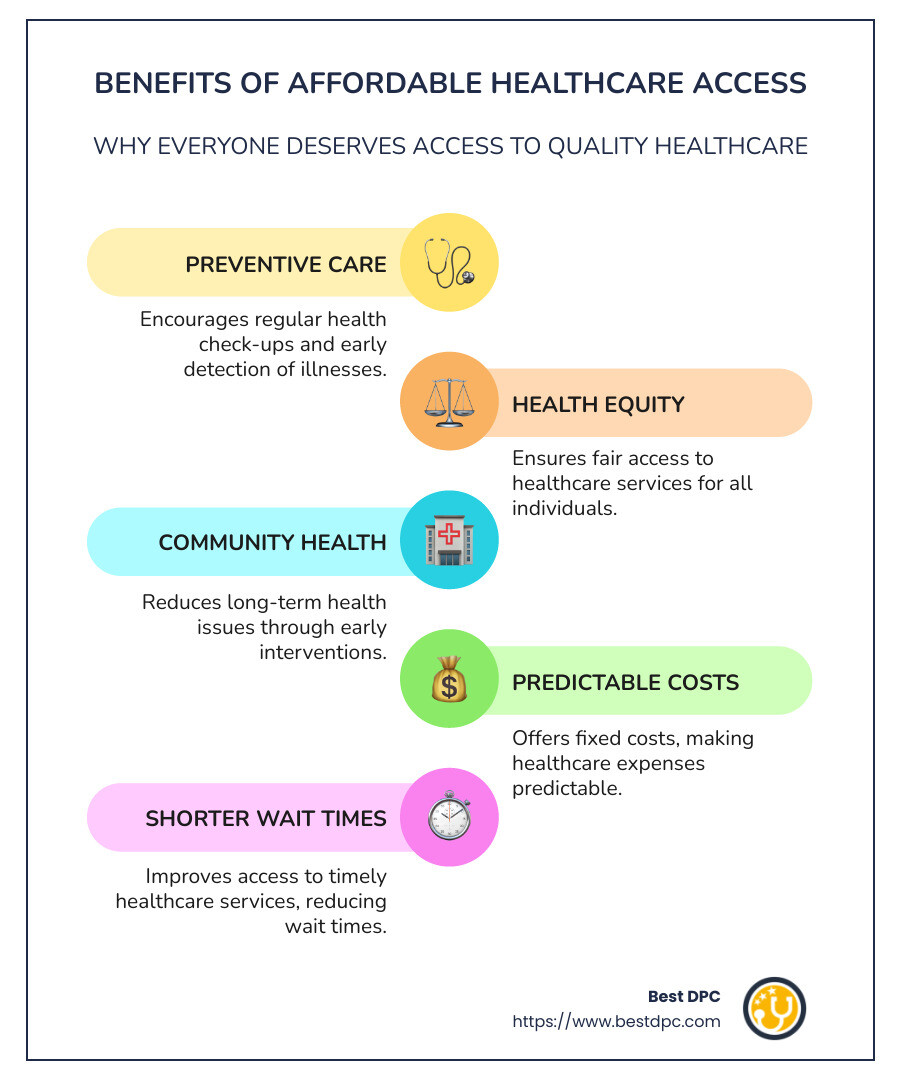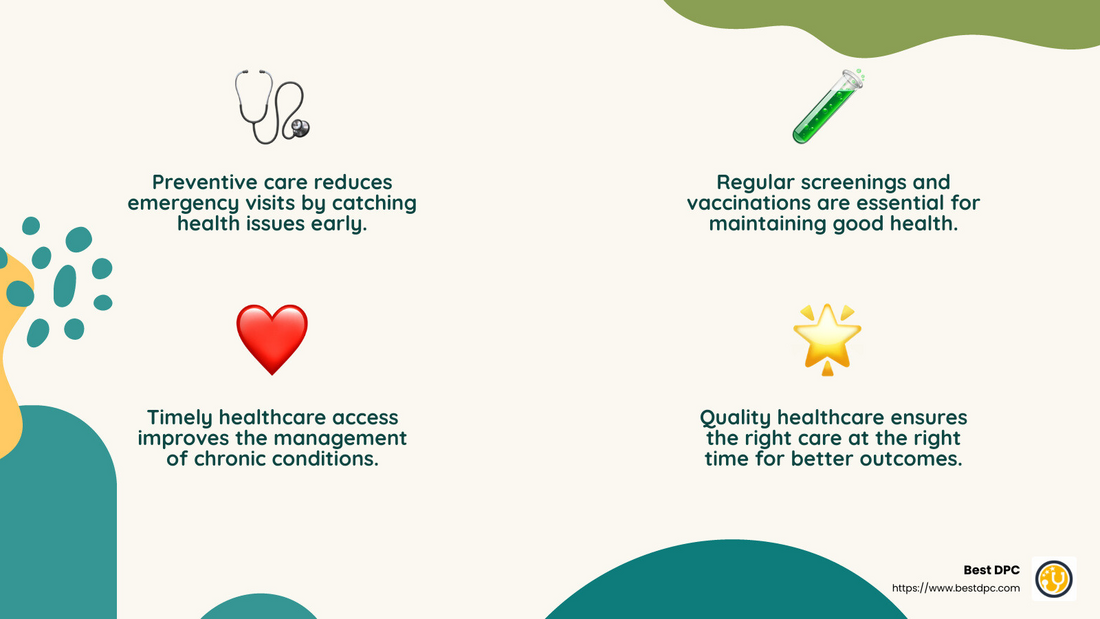Wayne Lowry

Affordable healthcare access is crucial for ensuring that everyone can get the medical care they need without facing financial hardships. When healthcare is affordable:
For busy professionals, affordable healthcare access is not only about cutting costs but also about having predictable medical expenses and shorter wait times.
Healthcare reform efforts, like the Affordable Care Act (ACA), have made strides in expanding access, particularly for marginalized groups. These initiatives aim to level the playing field, making sure that health equity, or fair access to health services for everyone, is achieved.

Understanding Affordable Healthcare Access
Affordable healthcare access is about more than just cost—it’s about ensuring everyone can use health services when they need them. This timely use of healthcare is essential for achieving the best health outcomes.
When people can see a doctor regularly, they can catch health issues early. This means fewer emergencies and better management of chronic conditions like diabetes or heart disease. Preventive care plays a big role here. It includes regular check-ups, screenings, and vaccinations that keep people healthy and reduce the risk of severe health problems later.

But affordable healthcare isn’t just about access. It’s also about quality healthcare. Quality means getting the right care, at the right time, from skilled professionals. When healthcare is affordable, people can choose providers based on quality, not just cost.
Quality healthcare leads to:
For example, studies have shown that people with health insurance are more likely to receive preventive services and have better health outcomes. This is because they can afford to visit healthcare providers regularly and maintain their health over time.
Having access to quality healthcare means fewer barriers to seeing a doctor and more opportunities for maintaining good health.
Affordable healthcare access is a pathway to a healthier, more equitable society. It’s about making sure everyone, regardless of income or background, can lead a healthy life.
The Role of the Affordable Care Act (ACA)
The Affordable Care Act (ACA) has been instrumental in broadening affordable healthcare access for millions of Americans. It achieves this through several key strategies: Medicaid expansion, premium tax credits, and Marketplace coverage.
Medicaid Expansion
Through Medicaid expansion, the ACA aimed to provide coverage to more low-income individuals by increasing the income threshold to 138% of the federal poverty level (FPL). This adjustment enabled more people to qualify for Medicaid, particularly in states that chose to participate in the expansion. Consequently, many individuals who were previously uninsured gained access to healthcare services.

Premium Tax Credit
The introduction of premium tax credits under the ACA has made health insurance more affordable for individuals with incomes between 100% and 400% of the FPL. These credits reduce the cost of monthly insurance premiums, making it more feasible for families to afford coverage. This financial support is vital for middle-income families who might otherwise face challenges in paying for health insurance.
Marketplace Coverage
The ACA established the Health Insurance Marketplace, a platform where individuals can compare and purchase health insurance plans. The Marketplace offers a variety of plans categorized by metal tiers—Bronze, Silver, Gold, and Platinum. Each tier has different cost-sharing structures, allowing consumers to select a plan that aligns with their financial situation.
Marketplace coverage also ensures that all plans provide essential health benefits, such as emergency services, maternity care, and mental health services. This standardization helps guarantee that everyone has access to comprehensive healthcare coverage.
Through Medicaid expansion, premium tax credits, and the establishment of the Marketplace, the ACA has significantly increased affordable healthcare access for millions. This has led to improved health outcomes and a reduction in the rate of uninsured Americans, particularly in states that embraced Medicaid expansion.
Challenges in Achieving Affordable Healthcare Access
While the Affordable Care Act (ACA) has made strides in improving affordable healthcare access, several challenges remain. These problems include high costs, an uninsured population, and persistent coverage disparities.
High Costs
The high cost of care often leads to delayed or skipped medical services, which can worsen health outcomes. Even preventive services, which are supposed to be covered, can seem out of reach due to associated costs like transportation or time off work.
Uninsured Population
Despite efforts to increase coverage, many people remain uninsured. Minority groups and low-income individuals make up a significant portion of the uninsured population.

The lack of insurance often means that people do not receive necessary preventive services or timely medical care. Uninsured adults are less likely to get screenings for chronic diseases, such as diabetes and cancer, which can lead to late diagnoses and more severe health issues.
Coverage Disparities
Coverage disparities continue to affect healthcare access. While Medicaid expansion has improved access in some states, those that chose not to expand face significant disparities. In non-expansion states, low-income individuals often fall into a “coverage gap,” where they earn too much to qualify for Medicaid but too little to afford marketplace plans.
Additionally, not all insurance plans are equal. Medicaid patients, for example, may face challenges finding providers who accept their insurance due to lower reimbursement rates. This can result in longer wait times and difficulty accessing specialists.
These challenges highlight the need for ongoing efforts to address affordable healthcare access. Solutions must focus on reducing costs, increasing insurance coverage, and eliminating disparities to ensure that everyone can access quality healthcare.
Benefits of Direct Primary Care
Direct Primary Care (DPC) is changing how people think about healthcare. It’s a patient-focused model that prioritizes the needs of individuals over paperwork and insurance hassles. Here’s how it works and why it’s beneficial:
Patient-Focused Model
DPC puts patients first. Instead of rushing through appointments, doctors in DPC practices take the time to listen and understand their patients. This leads to better care and stronger relationships between doctors and patients.
Example: A patient in a DPC practice can expect longer visits and more time for questions, unlike the typical rushed appointments in traditional settings.
Flat Monthly Fees
One of the standout features of DPC is its simple payment structure. Patients pay a flat monthly fee for a range of services. This fee covers routine care, preventive screenings, and even urgent visits. There are no surprise bills or co-pays, making healthcare more predictable and affordable.
Imagine paying a single fee each month and knowing exactly what services are covered. This transparency helps patients plan their healthcare spending without fear of unexpected costs.
Personalized Care
DPC offers personalized care custom to each patient’s needs. With fewer patients to see each day, doctors can focus on providing comprehensive care. This includes everything from managing chronic conditions to offering preventive advice.
A patient with diabetes can benefit from custom diet plans and frequent follow-ups to effectively manage their condition.
The DPC model addresses many of the challenges in achieving affordable healthcare access by focusing on the individual and removing the barriers of traditional insurance. This approach not only improves access but also improves the quality of care patients receive.
Frequently Asked Questions about Affordable Healthcare Access
Is affordable healthcare a right or privilege?
Affordable healthcare is often viewed as a basic human right. Many believe that everyone should have access to the care they need, regardless of their financial situation. Recent administration actions have aimed to make this a reality by expanding programs and reducing costs for those in need. Efforts like these are designed to help more individuals access health insurance, making healthcare more accessible.
What is the highest income to qualify for financial assistance in healthcare?
Under the Affordable Care Act (ACA), individuals and families with incomes between 100% and 400% of the federal poverty level (FPL) may qualify for premium tax credits to reduce the cost of health insurance purchased through the Marketplace. Additionally, the American Rescue Plan Act temporarily expanded eligibility for premium tax credits to individuals with incomes above 400% FPL for 2021 and 2022. It’s important to verify current eligibility criteria, as these provisions may change over time.
How does not having coverage affect healthcare access?
Lack of health insurance is associated with decreased access to medical care, including preventive services, and can result in delayed diagnoses and treatment. Uninsured individuals are more likely to experience adverse health outcomes and have higher mortality rates compared to those with insurance coverage. This delayed care often results in more severe illnesses that are harder and more expensive to treat. Financially, it can lead to overwhelming medical bills and debt. In fact, uninsured individuals are more likely to face financial implications such as using savings or borrowing money to pay for healthcare. This highlights the importance of having access to affordable healthcare to prevent these negative outcomes.
Conclusion
At Best DPC, we believe that affordable healthcare access is essential for achieving health equity. Our mission is to connect patients with Direct Primary Care providers who offer a patient-focused model that emphasizes accessibility and personalized care. By eliminating insurance hassles and providing flat monthly fees, we strive to make healthcare more affordable and accessible for everyone.
Health equity means everyone has a fair opportunity to achieve their best health. Unfortunately, many people still face barriers like high costs and limited access to quality care. This is where Direct Primary Care can make a significant difference. By focusing on the patient and removing financial obstacles, we help ensure that everyone can access the healthcare they need.
If you’re looking for a healthcare model that prioritizes your needs, consider exploring Direct Primary Care.
Join the Direct Primary Care movement for more accessible, affordable healthcare. Visit Best DPC now to find a provider who truly cares about your well-being.

ABOUT AUTHOR
Wayne Lowry
Wayne Lowry, Founder of BestDPC, is a passionate advocate for Direct Primary Care (DPC) and its mission to deliver personalized, accessible healthcare. He believes that DPC providers should serve as the trusted first point of contact for all medical needs, ensuring patients never feel isolated or uncertain about their health decisions. Through his work, he champions a patient-first approach to healthcare, building a system that prioritizes guidance, support, and trust.

Thank You for Registering!
Your registration was successful! We're excited to have you on board. Please check your email for a confirmation link to complete your registration.